Ending the Fossil Fuel Era
Air Date: Week of December 15, 2023
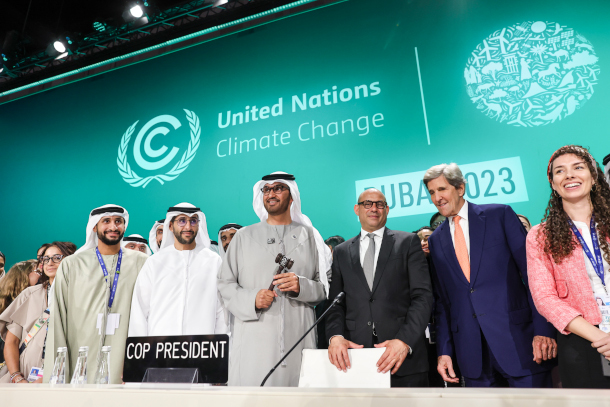
Delegates at COP28 finalized language around a “transition away” from fossil fuels in the morning of December 13, 2023. (Photo: Mahmoud Khaled, COP28, UN Climate Change, Flickr, CC BY-NC-SA 2.0)
Nearly 200 nations attending the COP28 UN climate summit in Dubai came to a consensus to declare fossil fuels are on their way out, marking a breakthrough after three decades of climate summits. Alden Meyer, a senior consultant at E3G, joined Host Steve Curwood from Dubai to explain the outcome and what’s needed to turn the words into action.
Transcript
O’NEILL: It’s Living on Earth, I’m Aynsley O’Neill
CURWOOD: And I’m Steve Curwood.
For days the recent UN Climate Summit in Dubai courted deadlock. This 28th conference of the parties could not move forward unless all of the nearly 200 nations attending agreed on a course of action. And with some demanding a complete phase out of fossil fuels including oil and gas, while others sought to block or slow down such changes it seemed there was little room for compromise. But in the end the rising number of catastrophes linked to climate disruption made it hard to deny the problems, and the risks of doing nothing. So, with nuanced words agreed to by all during overtime negotiations COP28 declared fossil fuels are indeed on their way out. Exactly how and when will be determined at future COPs, with climate advocates looking to the 2025 summit in Brazil to set rules in keeping with the 2015 Paris Climate Agreement. Alden Meyer is a climate advocate and senior consultant at E3G, and we called him up in Dubai shortly after COP28 wrapped up. Welcome back to Living on Earth, Alden!
MEYER: Thanks, Steve, it's always good to be with you.
CURWOOD: What was your reaction to the final text that was hashed out after the all night sessions?
MEYER: Well, I think overall, it clearly wasn't everything we want. We wanted something closer to the text that was tabled four days before the COP ended, which called for the phase out of fossil fuels. This one does not, it calls for a transition away from fossil fuels in the energy sector. It calls for tripling renewable energy capacity by 2030, doubling the rate of energy efficiency improvements by 2030. And it has some potential loopholes such as a clause that talks about the need for transition fuels. And people read that to mean natural gas. So it's not perfect, but it's a lot better than we've had before out of this process. Just to put it in context, until COP26 in Glasgow two years ago, there was not a mention of the need to phase down, phase out, transition away from fossil fuels in the UNFCCC process. Now in Glasgow, we got the language calling for the phase down of unabated coal emissions from the power sector. That's the first time that we got any real commitment to move away from fossil fuels. This sort of raises the stakes there because it expands it to oil and gas. And it dominated these talks for two weeks. It was the center of attention. Everyone was saying this was the key litmus test for how serious this process was. Was it gonna say something about the need to get off of fossil fuels? And well, it's definitely not perfect, and not everything we want. And it was a bit of a sausage-making process to get here, it does signal to the world that the transition away from fossil fuels is accelerating. And that's a good thing.
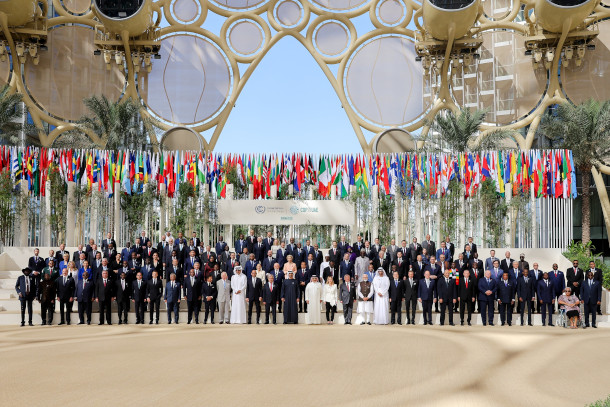
A group of dignitaries at the 2023 United Nations Climate Change Conference. (Photo: Fotografía oficial de la Presidencia de Colombia, Flickr, public domain)
CURWOOD: Alden, overall, would you say the COP28 created a breakthrough moment?
MEYER: I think it's a breakthrough in the sense that for the first time, you've got the countries of the world agreeing that we need to accelerate the transition away from fossil fuels, to a clean energy economy based on renewable energy, energy efficiency, and other technologies. So that's historic. Of course, it's not specifying the rate of change, or the scale of change, or the pace of change. So it was not just the Saudis, there were countries like the US and others that would not have accepted specific targets for when we're going to reduce production and consumption of oil and gas by x percent. That was just never in the cards. But it does say that by mid-century, we need to be on track to get to net zero emissions as a planet. That could involve some countries like India and China taking a little bit longer. And maybe some countries like the US having to do that a little bit faster. But we need to get there. And to get there, you have to phase down fossil fuel consumption pretty radically and pretty soon. You can't wait until 2045 or 2049, you've got to start doing it right away. It does call for all countries in their next round of pledges under Paris, encourages them to put forward economy-wide pledges covering all greenhouse gasses. Of course, China agreed to do that in the Sunnylands Statement about a month ago with Secretary Kerry. And that's a big deal, because I've been told that China's non-CO2 emissions - its methane, nitrous oxide, and other greenhouse gasses - if taken separately from CO2 would represent the third largest country in the world, just behind China and the US, in terms of emissions. We also have language in here calling for transforming the global financial system to mobilize much greater sums of both private and public sector finance, both to decarbonize developing country paths and to help scale up investments in resilience and adaptation, to cope with the impacts of climate change that are coming at us. Now, there's not enough in there in terms of the specifics, and most of the action on that front is not going to happen. In the UNFCCC, it's going to happen in places like next year's G20 meetings in Brazil. So there's a lot of good things in here. Not everything we want. There's a lot more work to do, particularly to translate this into action in the real world.
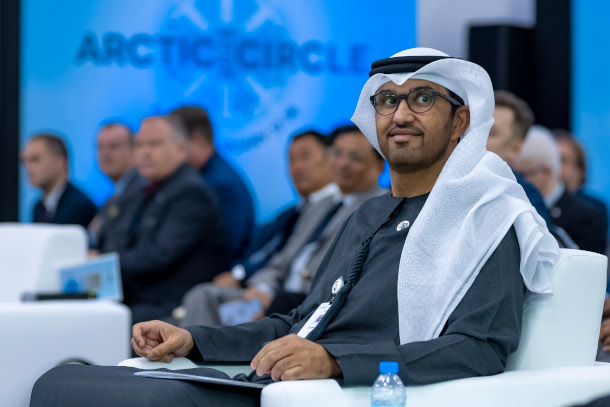
Sultan Al Jaber, the COP28 President, is also CEO of the state-owned oil company Abu Dhabi National Oil Company, or ADNOC. His appointment as COP28 President raised concerns in the environmental community. (Photo: Arctic Circle, Flickr, CC BY 2.0)
CURWOOD: So, how can we measure the success of this in the years going ahead, Alden?
MEYER: As we've discussed before, Steve, the atmosphere only cares about one thing: emissions. It's a matter of physics. It doesn't care what ministers or leaders say in declarations or treaties or pledges or action announcements. It's the bottom line, how much carbon, how much methane, how much nitrous oxide are you emitting to the atmosphere? So the acid test for this is going to come in the next couple of years. Will we see countries put dramatically more ambitious national pledges on the table in 2025 in the second round of Paris commitments? Will we see countries like China, rolling back construction of new coal plants and putting a plan on the table to reduce coal emissions in the second half of this decade? Will we see the US reconsidering expanding production and export of liquefied natural gas, which with the methane emissions incorporated is a bad way to go. Will we see the host country of these talks, the UAE rethink its plans to invest $150 billion in expanding oil production from 3 to 5 million barrels a day? Those are gonna be the kind of tests in the real world that will see whether this is serious, and countries are going to back up the talk with their walk.
CURWOOD: There’s a lot of criticism of the chap who was President of this, Sultan Al Jaber from the UAE, head of an oil company. And John Kerry, the US Special Climate Envoy really reached out to kind of put his arms around him metaphorically and say, no, this is a good guy, we can work with this guy. How important was that relationship, do you think, between John Kerry and Al Jaber in terms of getting a reasonably positive outcome in Dubai?
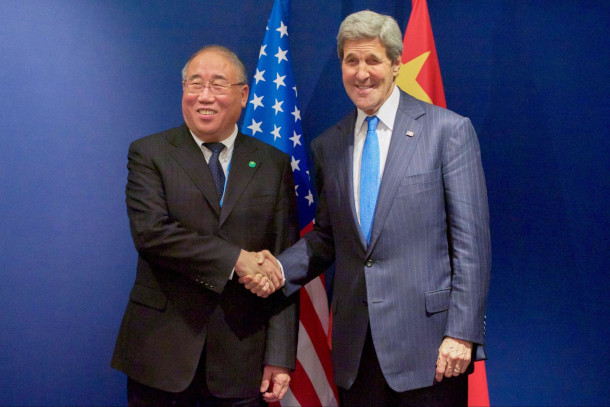
China’s Special Envoy for Climate Change Xie Zhenhua and US Special Envoy on Climate John Kerry released the Sunnylands Statement on November 14, 2023, promoting US-China cooperation on climate. They are pictured here in 2015. (Photo: US Department of State, Flickr, Public Domain)
MEYER: Well, I think it was a very important relationship. I would also say that John Kerry's relationship with Minister Xie from China was very important because they delivered a month in advance of the COP, the so-called Sunnylands Statement, which made some progress in China committing to take on economy-wide commitments to bring methane into the picture. And to try to decarbonize the power sector. And Secretary Kerry and Minister Xie worked very closely over the course of these two weeks, they were both in close communication with Dr. Al Jaber and the rest of the presidency team. So I think that was an important relationship. I mean, you have to judge him by the results, right? And, you know, I think there was a lot of skepticism that he would be able to pull this off, that he was too close to the oil countries and the oil and gas industry. Now maybe that actually worked to his advantage, because they knew him. They trusted him, they had a relationship with him. I've met him only a few times, he's a very sharp guy, very knowledgeable, has been in this space for 15 years, knows a lot of the players. I was skeptical he was going to be able to pull this off, frankly. But it could be that that expression of skepticism and the concerns about a potential conflict of interest in his role as COP President and his role as CEO of the Abu Dhabi National Oil Company lit a fire under him. And he said, okay, I'm gonna prove the skeptics wrong. And maybe that was a motivating factor to him. I don't know, I'm not a psychologist, and I don't know him closely enough to get into his head. But I could imagine that that would be a motivational factor to prove the skeptics and the doubters wrong.
CURWOOD: Now, let's talk a bit about money world wide. How does what is being sought in the agreement struck in Dubai, compare to the subsidies to the fossil fuel business around the world?
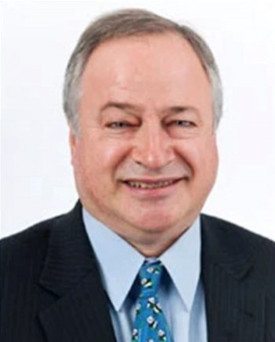
Alden Meyer is a Senior Associate at E3G working on US and international climate policy and politics. He is a Principal at Performance Partners, which provides a range of consulting services to clients in government, business, and the non-profit sector. (Photo: Courtesy of Alden Meyer)
MEYER: Well, just to put it in one comparison, the first day of the COP, we had a decision to operationalize the loss and damage fund that was called for in last year's COP in Sharm el-Sheikh, Egypt. They adopted that. And very soon thereafter, they assembled a little over $700 million in pledges from a number of countries to provide some seed funding for that fund to get up and running. Just to put that in perspective, we spend about three and a half billion dollars a day subsidizing people to produce and consume fossil fuels. Almost a trillion and a half dollars a year. So that 700 million represents about four or five hours of fossil fuel subsidy spending. And when you think about it, it's insanity. We're actually paying people to produce and burn something that we say is an existential threat to humanity, and is going to make the need for loss and damage funding much, much greater. It makes no sense. I was in Pittsburgh in 2009 when President Obama convinced other G20 country leaders to commit to phase out fossil fuel subsidies in the medium term, as they said. I think you can make an argument that 14 years later is the medium term. And far too few countries have actually followed through on that. Matter of fact, the International Monetary Fund says that fossil fuels subsidies have been increasing in recent years, not cut back. So that's literally the definition of insanity: digging the hole deeper and paying people to do something that you say you don't want.
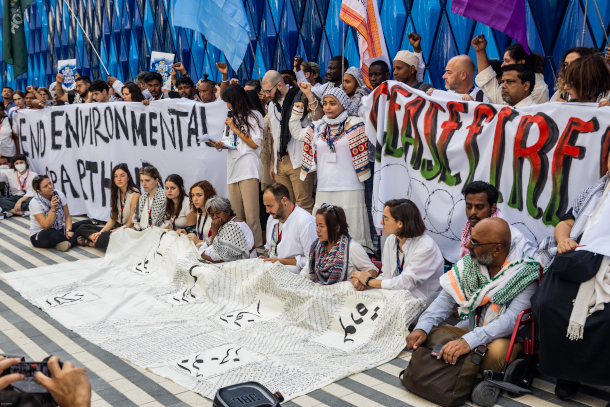
At COP28, some activists and delegates also expressed environmental concerns about the war in Gaza and called for a ceasefire. (Photo: Media Ninja, Flickr, CC BY NC 2.0)
CURWOOD: Alden, by the way, there were demonstrations calling for a ceasefire in Palestine at this point. What impact did that have on the negotiations? That particular issue?
MEYER: Well, that was an issue over here, it was the subject of statements by a number of countries on the floor. As you say, there were demonstrations and actions and chants and protests. People are very aware of what's going on in Gaza and the human suffering that's happening there. And there was broad support among both the civil society groups here and a number of countries here for a ceasefire. But I would say, I didn't see that disrupting or interfering with the ability of countries to work seriously to get the deal they reached at the end of the COP. There was a moment at the opening days of the COP where Iran walked out of the room when Israel made an intervention on the floor. But they did not leave the premises and, you know, not participate at all for the rest of the two weeks. Other than that, there was nothing that really I saw that was impeding or interfering with the negotiations on the climate agenda. But it just shows that, you know, this process is not immune from geopolitical stresses, whether it's the war in the Middle East, the war in Ukraine, the debt crisis in a growing number of developing countries, the tensions between the US and China. But in an interesting way, climate has become positioned as an area that is seen as a common threat, that we sort of have to rise above those divisions and work together as a species if we're going to address it. And I think you saw that, that spirit here at the end, even though there were very different positions on the final deal and the issues at play.
CURWOOD: Alden, you've been coming to these meetings for a long time, I think all but one. What gives you hope at this point?
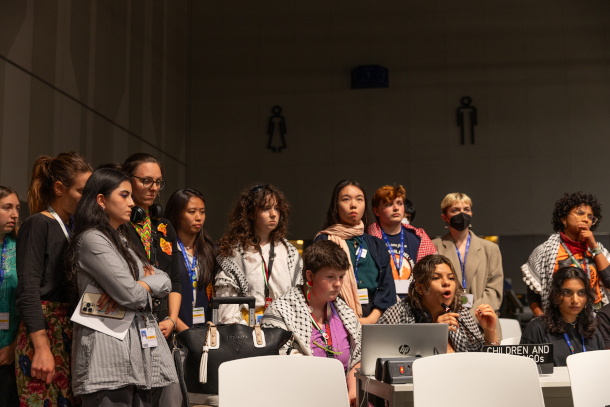
Youth representatives give a statement at the COP28 talks in Dubai. (Photo: Kiara Worth, COP28, UN Climate Change, Flickr, CC BY-NC-SA 2.0)
MEYER: Well, what gives me hope is the fact that despite all the tensions and the disagreements, countries were able to come to a consensus on a path forward here. It's not perfect, it's not as ambitious as I would have liked to see. But it definitely is a historic shift in these negotiations to say we have to come to grips with our addiction to fossil fuels. Now, that being said, the proof of the pudding is going to be in the next year or two, to see what countries actually do at home, what kind of commitments they put on the table, what impact this has on investors in the business community. But it was a real achievement. Another thing that gives me hope is the tremendous reductions that we see in the cost of the clean energy technologies that can replace fossil fuels, whether it's solar photovoltaic cells, wind turbines, electrolyzers, LED light bulbs, electric vehicles and batteries. I mean, just the force of those technology costs coming down is making tremendous shifts in the market. Not fast enough, not at the rate that we need, but it's accelerating. That gives me hope. And I would also say what gives me hope is the diversity of constituencies and voices coming into this process. When I started out in the run up to Rio in 1992, it was primarily the science community and some of the environmental movement that was driving this process. Now you have healthcare professionals, you have doctors, you have the faith community, you have labor unions, you have progressive business, you have indigenous people. And most importantly to me, you have the youth coming in and saying this is our future. You need to leave us an inhabitable planet. And so I think the fact that this has emerged as an issue that mobilizes all sectors of society to come in and demand action, gives me hope.
CURWOOD: Alden Myer is a senior associate at the climate change think tank, E3G. Alden, thanks so much for taking this time with us today.
MEYER: It was good to talk with you, Steve.
Links
E3G | ““The Fossil Fuel Era Is Ending” – E3G’s Reacts to COP28 Outcome”
Living on Earth wants to hear from you!
Living on Earth
62 Calef Highway, Suite 212
Lee, NH 03861
Telephone: 617-287-4121
E-mail: comments@loe.org
Newsletter [Click here]
Donate to Living on Earth!
Living on Earth is an independent media program and relies entirely on contributions from listeners and institutions supporting public service. Please donate now to preserve an independent environmental voice.
NewsletterLiving on Earth offers a weekly delivery of the show's rundown to your mailbox. Sign up for our newsletter today!
 Sailors For The Sea: Be the change you want to sea.
Sailors For The Sea: Be the change you want to sea.
 The Grantham Foundation for the Protection of the Environment: Committed to protecting and improving the health of the global environment.
The Grantham Foundation for the Protection of the Environment: Committed to protecting and improving the health of the global environment.
 Contribute to Living on Earth and receive, as our gift to you, an archival print of one of Mark Seth Lender's extraordinary wildlife photographs. Follow the link to see Mark's current collection of photographs.
Contribute to Living on Earth and receive, as our gift to you, an archival print of one of Mark Seth Lender's extraordinary wildlife photographs. Follow the link to see Mark's current collection of photographs.
 Buy a signed copy of Mark Seth Lender's book Smeagull the Seagull & support Living on Earth
Buy a signed copy of Mark Seth Lender's book Smeagull the Seagull & support Living on Earth

